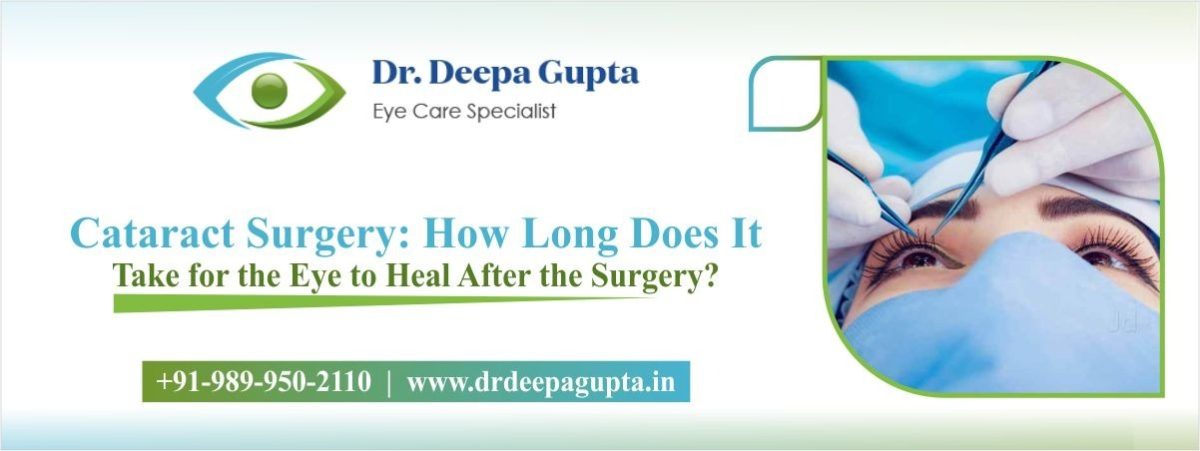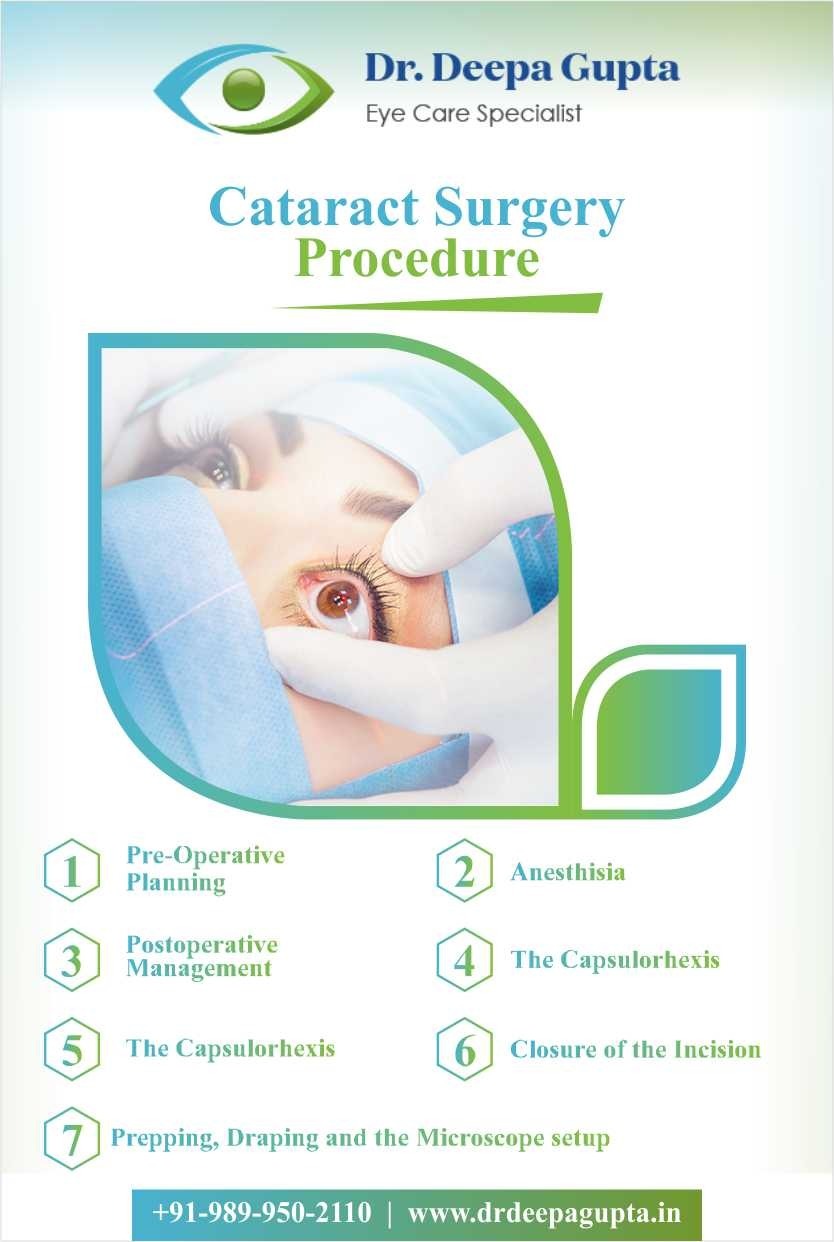Cataract Surgery: How Long Does It Take for the Eye to Heal After the Surgery?

Ageing brings along its inevitable changes that does not spare your eyes too ! Globally, cataract is one of the most common causes of treatable blindness. Irrespective of the aetiology of cataract, be it congenital, drug-induced, trauma-related or age-associated, cataract surgery is effective for all.
Many recent studies suggest an estimate for cataract surgery to be of around 65 lakh per year. Timely intervention and avoiding delays in cataract surgery curtails the chances of developing impaired vision. So, if that night driving is getting troublesome due to scattered light coming from opposite headlights or identifying a distant object is getting blur, you better not wait and watch !! Seek an ophthalmologist’s appointment at the earliest for “well begun is half done”.
1. WHAT HAPPENS IN CATARACT SURGERY?
In cataract surgery, cataract (meaning clouding of ocular lens) is removed from your eyes depending on the type of cataract diagnosed. The different types of cataract can be grouped as under:
- Nuclear Cataract – problematic facial and colour discrimination
- Cortical Cataract – sensitivity to light
- Posterior subcapsular Cataract – visual difficulties in bright light which improves with dim light
- Hypermature senile Cataract – severely challenged or complete loss of vision
- Congenital defects and white Cataracts – unable to see any degree of light
The severity of visual impairment dictates the technique for removal of cataract. You are advised not to eat or drink for 5-6 hours prior to surgery, when the cataract surgery is planned under general anaesthesia. With modern techniques, procedures are now being performed under local or topical anaesthesia as well. Based on the difference in methodology, various cataract surgery types are opted by the operating surgeon:
- Intracapsular Cataract Extraction (ICCE): involves removal of capsule and lens
- Manual Extracapsular Cataract Extraction: 9 to 13 mm of incision is placed for removal of lens and placement of intraocular lens (IOL). Low cost procedure.
- Manual Small-incision Cataract Surgery (MSICS): Externally 6.5 to 7 mm incision is placed in a V shape with internal length of incision being 9 to 11 mm, through which the lens is delivered out and IOL is placed. Allows for natural sealing of incision.
- Phacoemulsification: An ultrasonic probe is introduced through a small incision of 2 to 3 mm. The probe emulsifies the lens which is then aspirated. It is followed by insertion of foldable IOL. Allows for self-sealing of wounds.
- Femtosecond Assisted Laser Cataract Surgery (FLACS): Lens is defragmented and replaced with IOL by means of assisted laser technique.
Instructions for post-operative care along with medications are prescribed. You are advised for follow-up visits to keep a tab on the healing process.
2. HOW LONG DOES IT TAKE FOR THE EYE TO HEAL AFTER CATARACT SURGERY?
Advanced automated procedures have led to the advent of quicker surgeries. Laser assisted techniques require less than a minute for operating. With smaller incision techniques also, the surgery time is reduced remarkably compared to historical techniques of cataract removal. It typically takes not more than an hour for the entire cataract surgery to be performed and the patient can be discharged soon. You must ensure to follow precautions after your cataract surgery in order to keep any potential risk at bay.
Quicker surgery results in minimal postoperative risks and rapid recovery. Smaller to no incisions allows for natural wound healing.The vision is restored to almost full accuracy. You can witness your dreams with a clear vision almost as soon as you activate your plan of action.
3. WHAT CAN YOU EXPECT AFTER THE SURGERY?
While you may be thinking about what precautions you need to take after cataract surgery, we have the following points for you.
- Follow your post-operative instruction list as directed by the treating surgeon.
- You are prescribed topical corticosteroids, antibiotics and non-steroidal anti-inflammatory eye drops for 3 to 4 weeks.
- It is recommended to be assisted with someone to the clinic and avoid self drive.
- It is advisable to avoid any kind of strain to the eyes that puts pressure on the operated eye
- Protective eyewears are recommended for use, in order to prevent exposure to dust and water.
- Make a follow-up visit, in case of complications like- oedema, infection, bleeding, eyelid drooping or excessive pressure on the operated eye.
4. TAKE AWAY
Success rates of cataract surgery are quite high eliminating the chances of cataract blindness. Safety and efficacy of treatment in cataract surgery is of critical importance. High standards of care and precision in technique allows for remarkable accuracy. With corrected vision there is development of an improved sense of emotional and mental well-being. There is an overall decrease in mortality rate because of patients undergoing cataract surgery as it leads to lesser traffic crashes and reduced cases of unemployment, anxiety, injuries and hospital admissions.
An eye check-up is recommended every 6 months for age groups 60 and above while annually for the younger generation.
Dr. Deepa Gupta has commendable operating skills which are par excellence. She is adept with modern facilities and techniques like phacoemulsification and femto laser-assisted cataract surgery. Her work is trusted beyond uncertainties all over Delhi. Also the cataract surgery cost is most reliable and worthy of the standard care that the facility provides.
FAQs
- How can I achieve the best cataract surgery recovery?
Best cataract surgery recovery is possible by ensuring adequate rest to the eyes and protection against all sorts of irritants.
- What Will Happen With My Eyes in the Future?
Cataract surgery restores your visual acuity to near accuracy by preventing and correcting blindness
- Can a Cataract Grow Back in the Synthetic Lens?
No. Cataract cannot develop on synthetic lenses as it is inorganic in nature compared to organic human tissue.
- Why is my vision still blurry after cataract surgery?
Blurred vision after cataract surgery could be due to the eye taking its adapting time to the new intraocular lens or due to leakage in the retina from surrounding blood vessels. The vision becomes clear in a matter of a few days or 2-3 weeks.
- Does cataract surgery involve incision?
Advanced cataract surgeries involve a small incision of 2.2 mm, which heals in a matter of hours.

